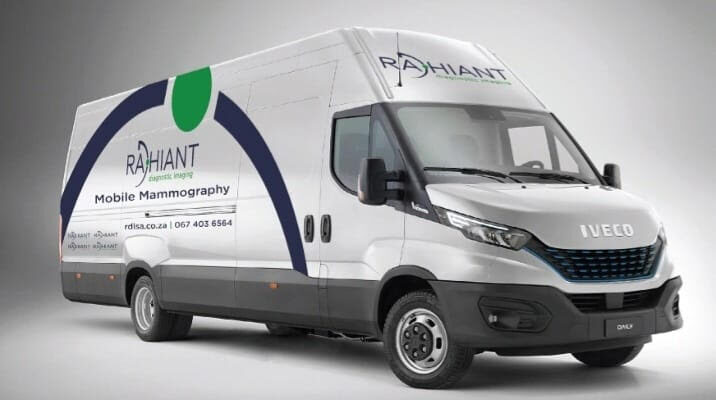By Anga-Anganda Bushwana and Benny Mojela
Earlier this year, Dr Anith Chacko, a qualified radiologist and managing director at East Coast Radiology, decided to bring mobile mammography services to small towns around the Eastern Cape – and Makhanda was first on his list.
According to Fatima Davids, head mammographer at Radhiant Diagnostic Imaging, the mobile mammograms are charged at medical aid rates, and are usually deducted from medical aids’ risk and preventative benefits (depending on specific plans). They also include further ultrasound workups if necessary. The cash rate is R999, which is the cost of the mammogram procedure only.
Radhiant group also offers pro bono work, together with local clinics, where they offer up to five free mammograms to people without medical aid or funds, in the hope that those most in need will also be able to access mammograms. Thereafter, further workup will be taken over by the normal referral pathway of the local clinics.
“Dr Chacko noticed over time that there was a good screening of patients in and closely around East London. However, patients from Makhanda usually presented for investigation too late (when they actually felt pain or lumps)”, said Davids.
Davids added that Chacko decided to bring the service closer to the towns and villages in Eastern Cape. With the high costs of equipment and infrastructure involved in setting up mammogram centres in each town, Chacko decided on mobile mammography as a solution.
According to the Cancer Association of South Africa, “apart from non-melanoma skin cancer, breast cancer is the most common cancer in women of all races, with a lifetime risk of 1 in 27 in South Africa”.
Approximately 19.4 million women in South Africa whom are 15 years and older live at risk of being diagnosed with breast cancer. Mammography is the most commonly used breast imaging test that detects early signs of breast cancer and aids in diagnosing breast diseases. It is used as a screening test which means that a mammogram is done as a yearly examination in women (and sometimes men) over the age of 40 who do not have any symptoms, or in people who have a family history of breast cancer.
“The gap between what is needed and what is provided is massive. We have had a very positive response from general practitioners and the community throughout our region so far. We aim to expand the offering soon with mobile x-rays, ultrasound, and even computed tomography (CT) scans,” said Davids.
The mobile mammogram vehicle has visited Makhanda twice so far and is scheduled to return to the town on a regular basis.


